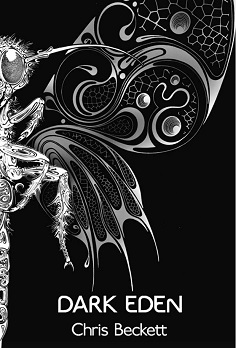
Dark Eden
Chris Beckett
404 pages
published in 2012
Dark Eden won the 2013 Arthur C. Clarke Award and was also a finalist for the BSFA Award, which is why I got it from the library when I saw it there. It won against fairly stiff competition like Ken MacLeod’s Intrusion as well, so I was curious to see if it was worthy of the win. To be honest, I was slightly disappointed. This isn’t a bad novel, but it’s a bit on the slight side for my liking.
To start with the positives, the world Beckett depicts in Dark Eden, a planet far out in interstellar space, a rogue wanderer without a sun, with life only possible through the presence of geothermal energy, which the local lifeforms have evolved to make use off one way or another. Trees grow out of the heat channels running from the planet’s core, the basis for a complex ecology that luckily for the people that crashed into Eden, turns out to be compatible with human life. Five people landed on Eden, three people decided to try and leave again, two remained behind and started a family. Twohundred years later their descendants number roughly fivehundred, still living in the same valley their ancestors landed in, having degenerated into hunter gatherers, losing most skills and knowledge of their ancestors in the process.
This is the central conceit in the story you need to swallow to be able to enjoy it. We don’t get to see the original crash landing or how the castaways first made their home on Eden, but get to hear their story in bits and pieces through the legends, plays and stories their descendants tell about them. So we never get to know why two of the five, Tommy and Angela decided to stay on Eden and not only stay, but start a family in such bleak circumstances. Was it an accident, design, was it entirely voluntarily on Angela’s part? We don’t get to know, nor why they decided to do so knowing full well the risk of inbreeding that would plague later generations. For the story Beckett wanted to tell, Eden needed to have its Adam and Eve and so it got it.
The other thing you need to swallow is how Beckett lets his characters talk. Dialogue is in a simplified, slang ridden dialect, with emphasis created by doubling up words, which gets old old fast fast. Time is calculated in womb times, fucking is called slipping, there are various mangled words (Genda, Any Virsy, etc) that you can feel smug about for knowning when the characters don’t. Once you get used to it it’s not too bad, but it did take a while for me to do so.
As Dark Eden opens, the population explosion in the small valley the Family lives in has reached a crisis point, though nobody recognises it. Food resources are getting more and more scarce and more and more people have to work harder and harder to feed everybody. The situation is made worse by the fact that the Family is bound by tradition to live together and close to where the original castaways landed and that the Family is hence literally hidebound and utterly inflexible in its traditions, venerating the elderly and ruled as a sort of matriarchy, which we’ll get back to.
Dark Eden is a traditional science fiction sort of story and it’s no wonder then that as its main protagonist it has a young man, John Redtree, brighter and more curious than the overwhelming majority of the Family, who is the only one who both recognises the danger it is in and willing to take action to prevent it. It also turns out John is a bit of an inventor, at one point inventing proper clothing, though the idea of animal husbandry comes from somebody else fortunately, or the Clan of the Cavebear in space vibe would’ve been even stronger.
As it is, the story flows along expected lines. John chafes against the traditions and restrictions of the Family and pushes for change. The elders don’t listen, while the younger generation does, things come to a head and the Family is split, with John and his followers moving out, ultimately attempting to leave the valley system they’ve lived in ever since the crash landing.
Interwoven with this is the secondary theme, of the transition between a traditional, incurious, cooperative matriarchal society to one where aggressive, restless men are in charge, both for the better and the worse. As it’s put in the story: “The time of men was coming, I could see,” says Tina. “Women had run things so far, when there was just one Family, but that was over now, and in this new broken-up world it would be the men that would get ahead.” Beckett presents this both as inevitable and largely positive, even if also releases the spectre of violence and murder into Eden. It does make for a gender essentialist sort of story, where the male characters are dynamic and forceful and the women are content to follow.
What saves it is the presence of Tina Talltrees, as smart as John and smart enough to see that for all his good sides, he’s a bit of a psychopath, always wanting to be in control, always looking for a new challenge, sometimes too eager to seek conflict rather than compromise. After John, Tina is the most prominent voice in the book and her general sarkiness cuts through some of the earnestness of the rest of it.
Dark Eden is ultimately a traditional science fiction novel of change and the conflict it brings, slightly more sophisticated than its golden age models in that it recognises change, even if necessary, is not always entirely a good thing. It’s clearly an attempt to write a serious book, but it didn’t challenge me enough and I’m surprised it won the Clarke Award.